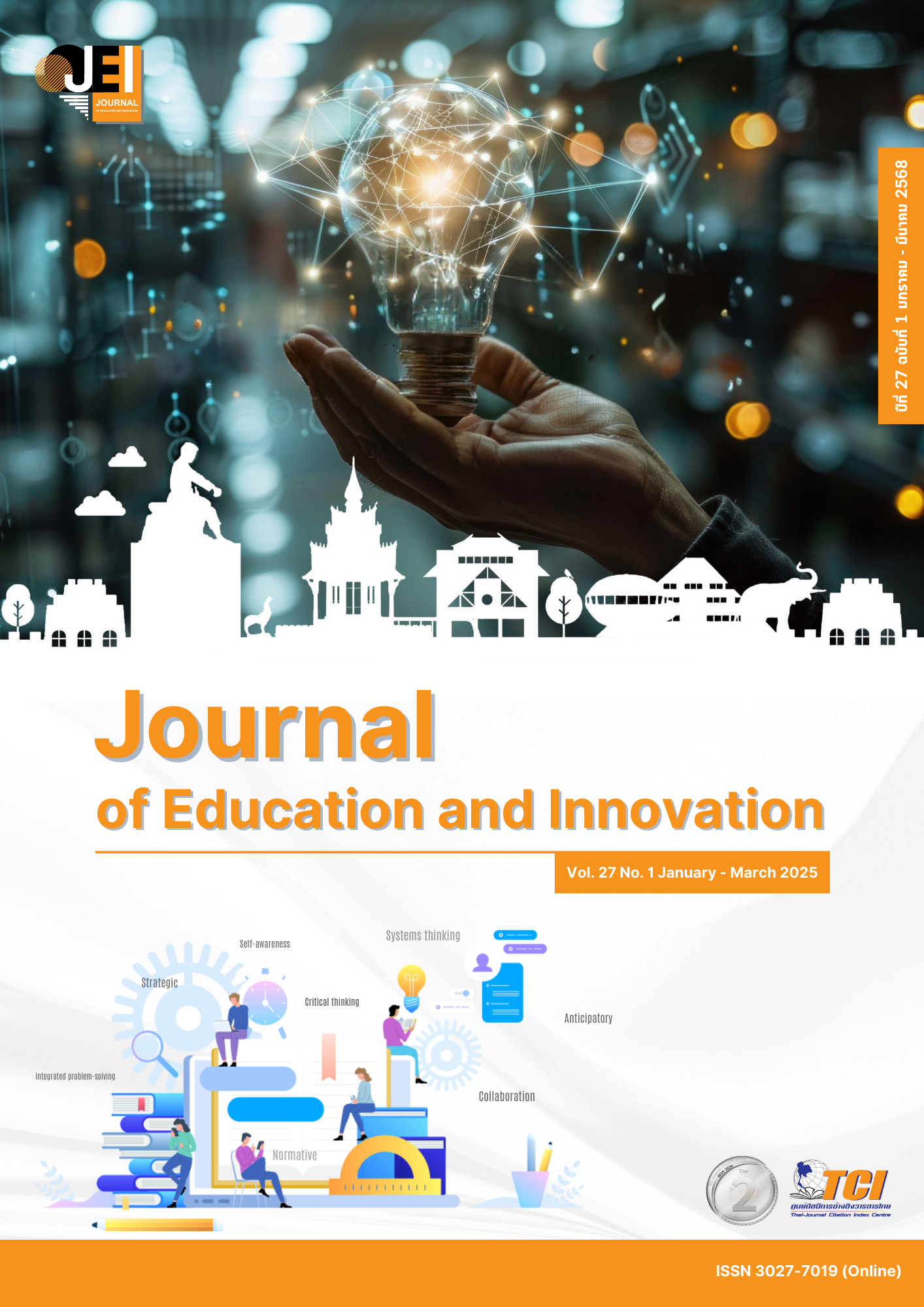DEVELOPING ALGORITHMS FOR KNOWLEDGE SYSTEMS DRIVEN BY AI TO SUPPORT PRODUCT DEVELOPMENT IN THAI LOCAL COMMUNITIES
Main Article Content
Abstract
This study explores the implementation of artificial intelligence (AI) algorithms for personalized product development education in Thai rural communities. The research addresses skill deficiencies, promotes economic growth, and enhances educational accessibility through tailored learning experiences. Employing a One-Shot Case Design, the study engaged 50 volunteer participants from the Sop Prap Subdistrict, utilizing surveys, interviews, opinion questionnaires, and competency assessments for data collection. Analysis encompassed descriptive statistics to evaluate the effectiveness of the proposed AI framework. Experimental results showed that: The AI-driven personalized learning approach made education more effective and enjoyable for learners in rural Thai communities. By tailoring the educational experience to each learner's unique needs and preferences, the AI framework improved retention of product development knowledge and skills, ultimately enhancing the quality of locally produced goods. The study's findings suggest that AI-driven personalized learning could be a valuable tool in bridging the skills gap and promoting economic development in rural areas of Thailand.
Article Details

This work is licensed under a Creative Commons Attribution-NonCommercial-NoDerivatives 4.0 International License.
The owner of the article does not copy or violate any of its copyright. If any copyright infringement occurs or prosecution, in any case, the Editorial Board is not involved in all the rights to the owner of the article to be performed.
References
Burd, E. L., Drummond, S. A., & Hogge, B. (2015). Deployment of an integrated gaming and multimedia environment for academic learning. Journal of Educational Technology Systems, 43(3), 259-276.
Coffield, F., Moseley, D., Hall, E., & Ecclestone, K. (2004). Learning styles and pedagogy in post-16 learning: A systematic and critical review. London: Learning and Skills Research Centre.
Felder, R. M., & Spurlin, J. (2005). Applications, reliability and validity of the index of learning styles. International journal of engineering education, 21(1), 103–112.
Hu, X., Chu, S. K. W., Ng, W., & Kirse, G. (2018). An immersive learning system using Kinect for computer science education. Proceedings of the 49th ACM Technical Symposium on Computer Science Education, 49, 324-329.
Khamparia, A., & Pandey, B. (2017). Knowledge and intelligent computing methods in e-learning. International Journal of Technology Enhanced Learning, 9(2), 221-242.
Kinshuk, S. G., & Liu, T. C. (2009). Supporting teachers in identifying students' learning styles in learning management systems: An automatic student modelling approach. Journal of Educational Technology & Society, 12(4), 3-14.
Klasnja-Milicevic, A., Vesin, B., Ivanovic, M., & Budimac, Z. (2011). E-learning personalization based on hybrid recommendation strategy and learning style identification. Journal of Computers & Education, 68(3), 885-899.
Kurdi, M. Z. (2017). Natural language processing and computational linguistics 2: Semantics, discourse, and applications. Oxford: John Wiley & Sons.
Latham, A., Crockett, K. & McLean, D. (2014). An adaptation algorithm for an intelligent natural language tutoring system. Journal of Computers & Education, 71(1), 97-110.
Lester, J. C., Spires, H. A., Nietfeld, J. L., Minogue, J., Mott, B. W., & Lobene, E. V. (2014). Designing game-based learning environments for elementary science instruction: A narrative-centered learning perspective. Information Sciences, 264, 4-18.
Luckin, R., & Holmes, W. (2016). Intelligence Unleashed: An argument for AI in Education. London: UCL Knowledge Lab.
Madi, T., Issa, H. A., Trad, E., & Madi, K. (2015). Artificial Intelligence for Speech Recognition Based on Neural Networks. Journal of Signal and Information Processing, 6(1), 66-72.
Pagulayan, R. J., Steury, K., Fulton, B., & Romero, R. L. (2005). Designing for fun: User-testing case studies, Springer, 4(2), 137-161.
Phitsamai, S., & Oraphin, S. (2009). Approaches to Developing Community Products for the Global Market. Journal of Humanities and Social Sciences Research, 7(1), 42-53.
Prensky, M. (2003). Digital game-based learning. Computers in Entertainment (CIE), 1(1), 21-28.
Squire, K. (2008). Open-ended video games: A model for developing learning for the interactive age. United States: MIT Press.
Truong, H. M. (2016). Integrating learning styles and adaptive e-learning system: Current developments, problems, and opportunities. Computers in Human Behavior, 55, 1185-1193.
Wolk, C., & Nikolai, L. A. (1997). Personality types of accounting students and faculty: Comparisons and implications. Journal of Accounting Education, 15(1), 1–17.
Zackariasson, P., & Wilson, T. L. (2012). The video game industry: Formation, present state, and future. London: Routledge.


